What are the BEST Air Plants for Low Light?
Finding the best air plants for low light was not as easy as I thought. Some require extensive care, others are prone to mother nature, and lots are just not simple & quick enough to grow.
That is why I created the 10 BEST Air Plants for Low Light.
This ultimate guide will give you the best air plants to grow, why you should grow them, and even how to grow them.
10 Best Air Plants for Low Light
#1. Sky Plants (Tillandsia Ionantha)
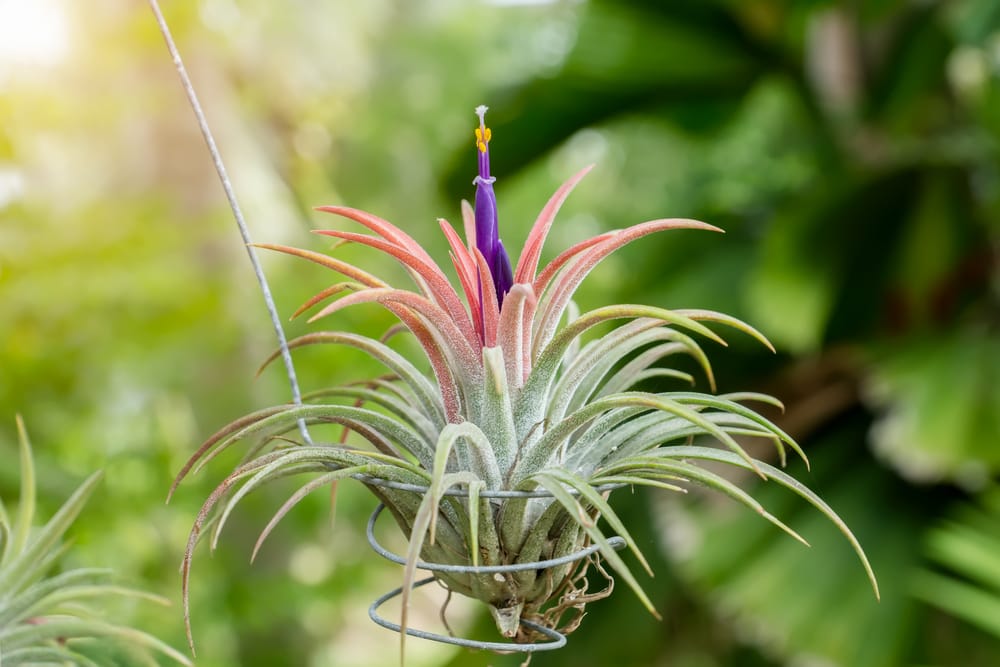
Identifying Characteristics and Facts
- Grows to about 2 – 4 inches in height.
- Have narrow and silvery-green leaves. Leaves are triangular, thin, and spiky.
- Produces small and tubular flowers when mature.
- Grows on rocks, trees, and other surfaces.
- Thrives in direct and indirect light with some good air circulation.
- Easy to care for and maintain.
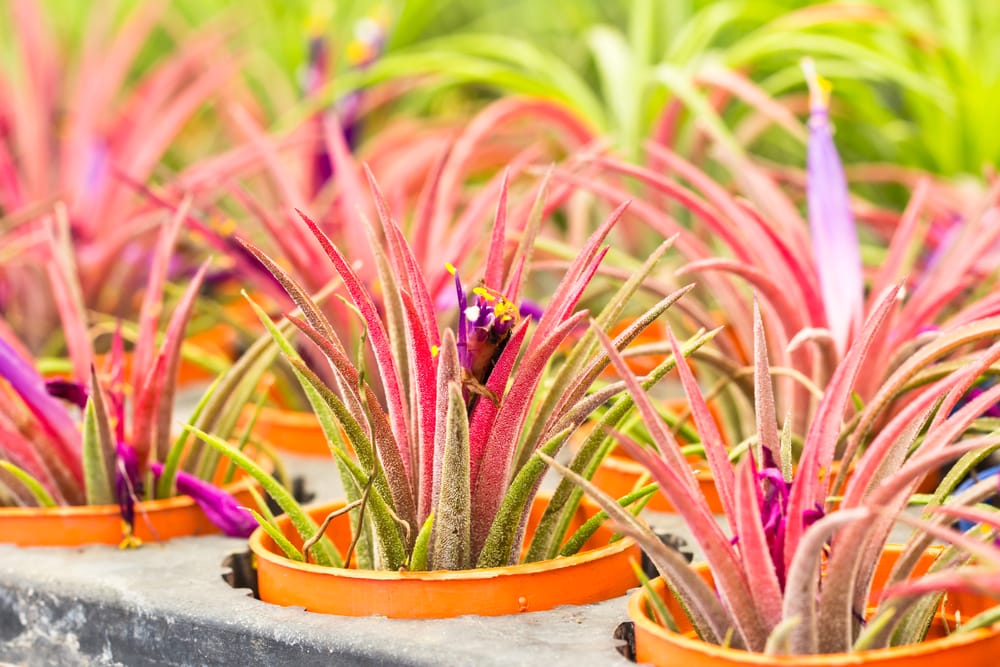
Sky plants are fascinating and are one of the best air plants for low light. They come with slender leaves that span the color from silvery green to red. You will also note that they do exhibit a remarkable ability to thrive without soil and hence require very low maintenance.
In addition to that, they attach themselves securely onto structures utilizing specialized roots known as trichomes, through which they effortlessly absorb moisture and nutrients. This quality renders them ideal for those seeking low-maintenance greenery options.
Providing them with adequate air circulation, bright indirect light exposure, along with regular misting or soaking is crucial for their well-being. Enthusiasts and collectors value these botanical wonders due to their convenience in terms of size and versatile applications.
You can creatively display these sky plants by mounting them on driftwood or suspending them within glass terrariums.
#2. King Air Plant (Tillandsia xerographica)
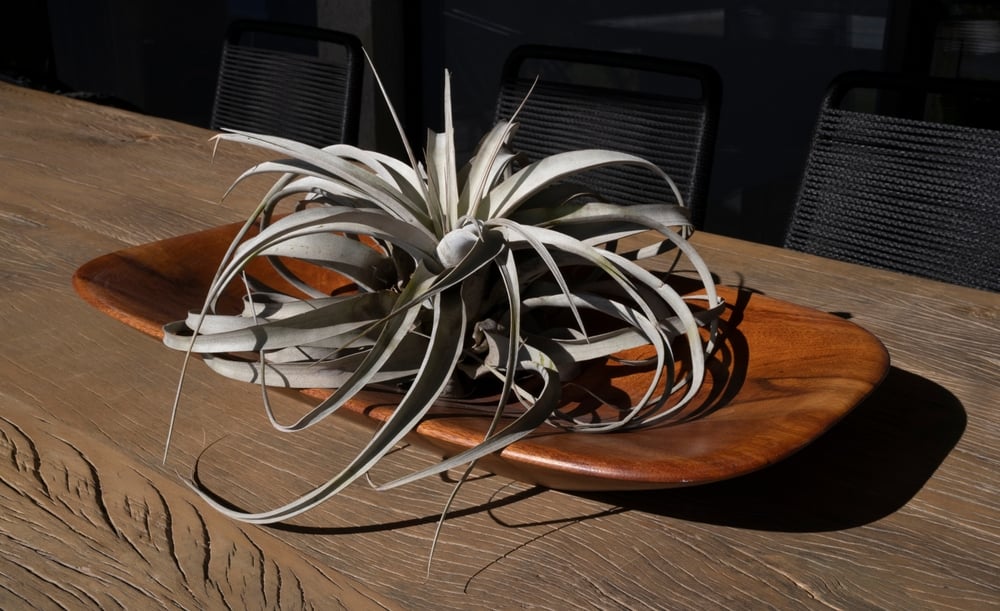
Identifying Characteristics and Facts
- Gray-green leaves with rosette shape. Leaves are succulent, thick, and stiff.
- The leaves are broad and triangular with a waxy coating.
- Mature ones can reach up to 3 feet high.
- Can take many years to reach its full size.
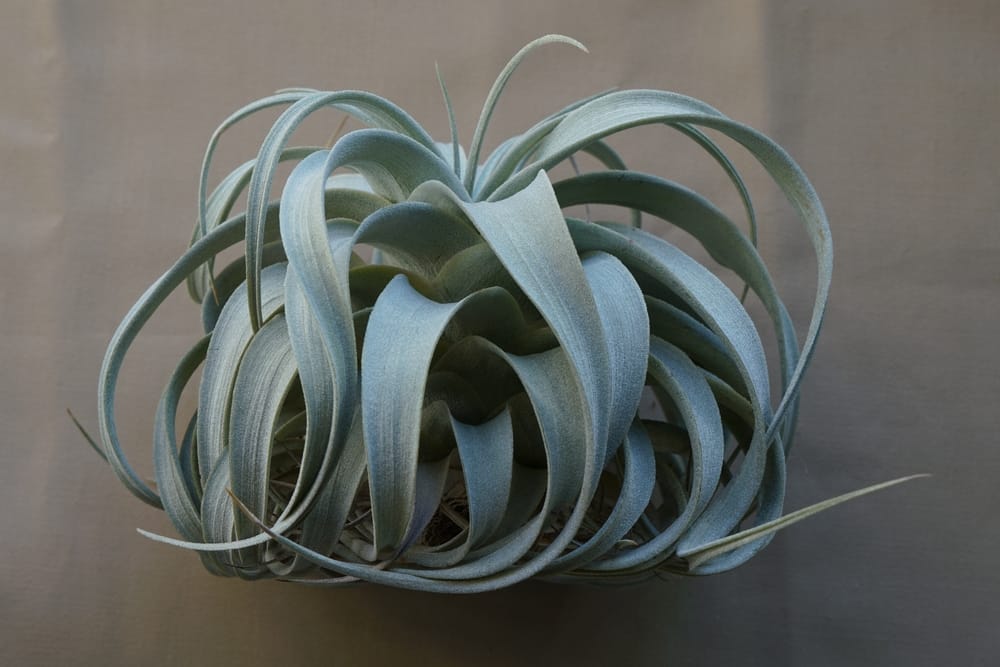
This air plant is native to the cloud forests of South America. It is characterized by its alluring arrangement of silvery gray leaves that form a rosette shape. The best part about this air plant though is that you can grow it right in your home!
Not only are these leaves visually captivating, but they also serve as vital reservoirs for water storage due to their impressive thickness and succulence.
Despite its slow growth rate, taking several years to reach maturity, Tillandsia xerographica has become a highly sought-after houseplant due to its relative ease of care. One distinguishable feature of this plant is its ability to thrive without soil, just like other air plants.
While Tillandsia xerographica thrives under bright and indirect light, it also demonstrates an admirable tolerance for limited exposure to direct sunlight. Additionally, this resilient species has the ability to adapt to a wide range of temperature variations, making it one of the best air plants for low light.
#3. Medusas Head Plant (Tillandsia Caput-Medusae)
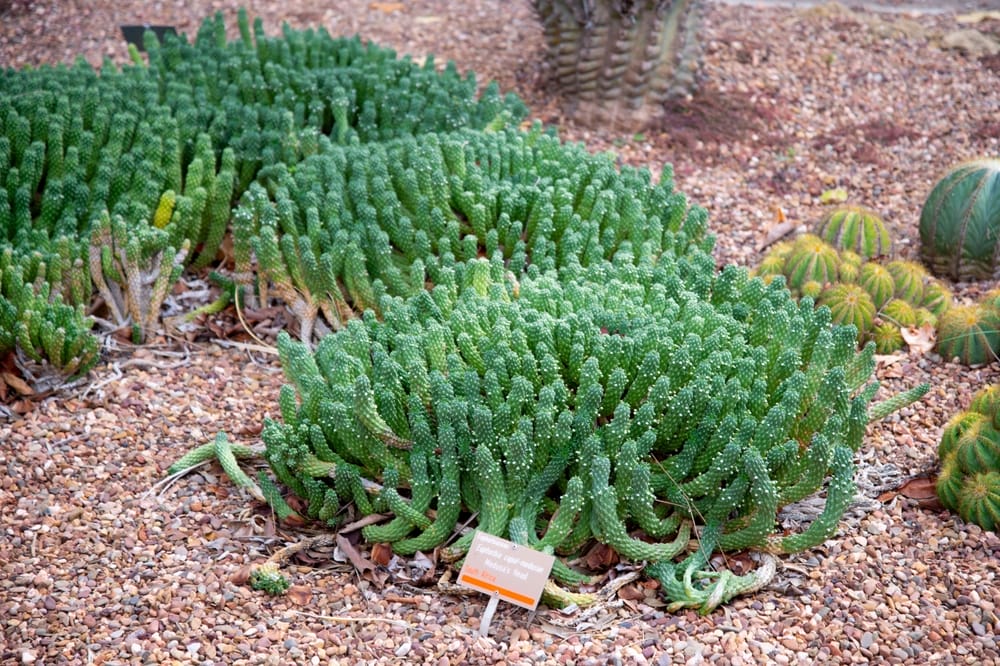
Identifying Characteristics and Facts
- Grows in rosette formation. Leaves are narrow, long, and curled upwards.
- The leaves are silvery or grayish with hints of pinkish and purple.
- The leaf surface is covered with some tiny trichomes.
- Doesn’t require soil and can produce vibrant flowers with tall stalks.
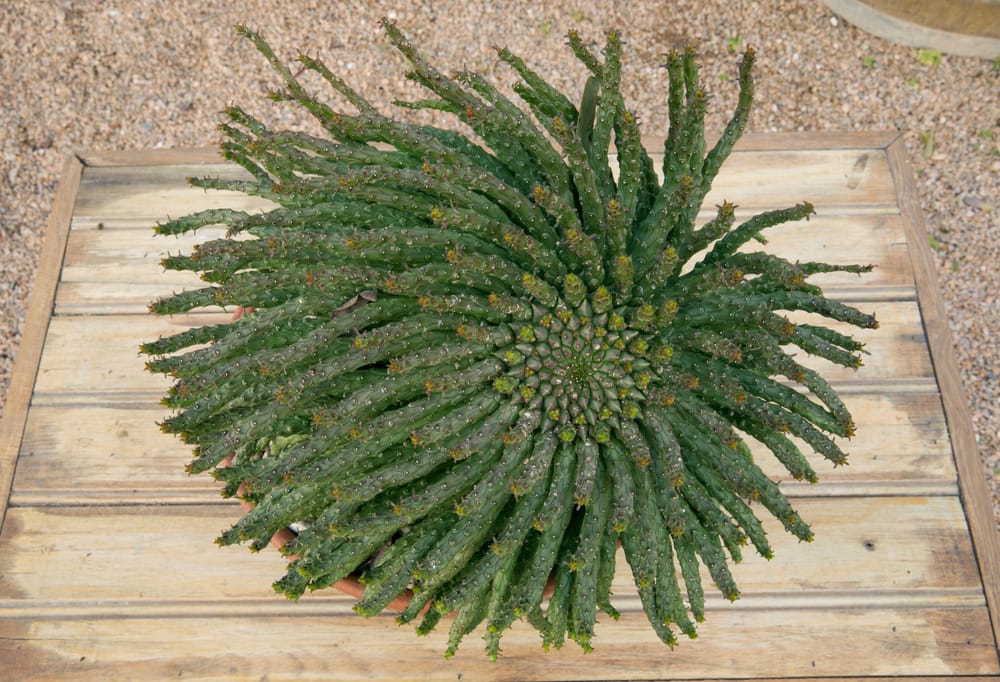
The Medusas head plant has its origin in Mexico. It flourishes by attaching itself to trees, rocks, or any other firm surface. This air plant is highly esteemed for its extraordinarily beautiful appearance.
Its elongated, slender, and sinuous leaves showcase vibrant shades of green with subtle hints of pink and purple. This makes it an appealing air plant and you can use it for decoration for home or office.
In addition to that, the air plant derives its nourishment and moisture from the atmosphere through specialized scales on its leaves. This makes it a perfect choice for low-maintenance indoor gardening.
With proper care, this air plant can flourish in various environments. Of course, it doesn’t require much of it and that is why it is one of the best air plants for low light.
Another thing about this air plant is that whether suspended in mid-air or elegantly displayed in decorative containers, it can grow and thrive.
#4. Brachycaulos Air Plant (Tillandsia brachycaulos)
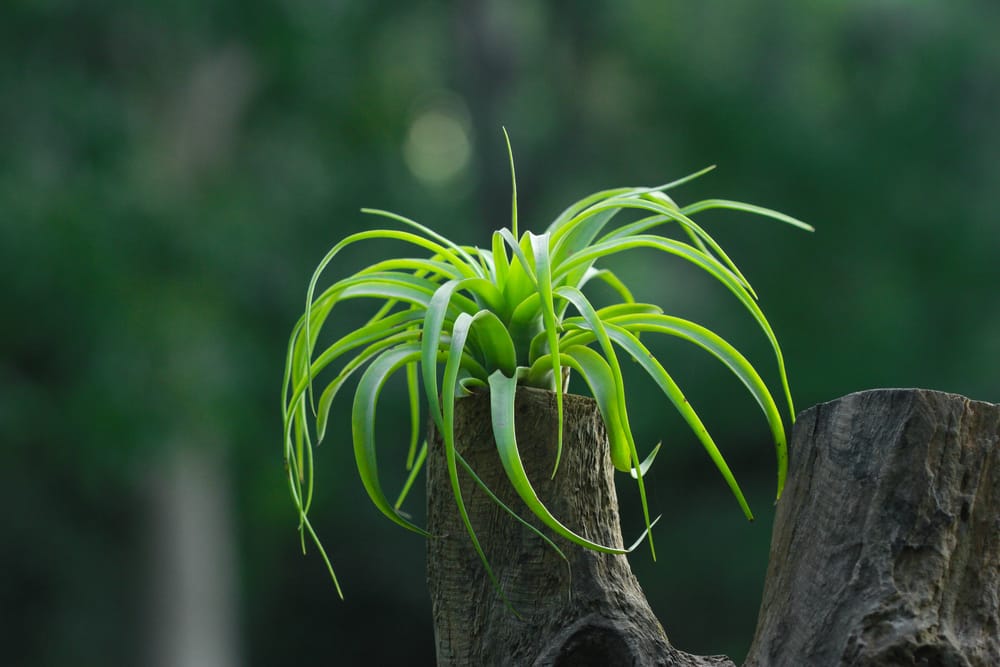
Identifying Characteristics and Facts
- Grow flowers, pups, or offsets when mature.
- Grows to about 4 – 6 inches high.
- Have stiff and broad leaves that curl inwards.
- Long and slender with a rosette-like shape.
- Thrives in areas with moderate temperatures.
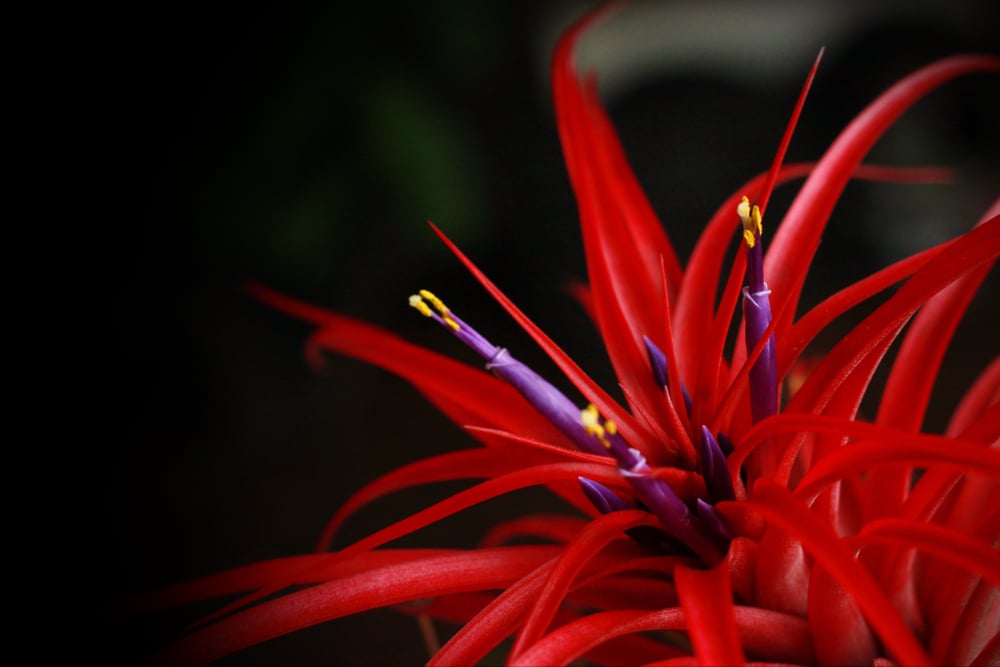
The Brachycaulos is a popular and unique air plant esteemed for its appearance. Just like other best air plants for low light, this one doesn’t as well require soil to grow.
The air plant has a long and slender rosette-like shape that displays vibrant and bright colors when they are exposed to light. When it comes to features, they can thrive in moderate temperatures in areas where there is bright or indirect light.
For them to do well, you can mist them by watering them only a few times a week. You may as well want to soak them in water just for about 20 minutes once a week.
After all, good air circulation is necessary for these air plants to do well. You, therefore, need to ensure that there is adequate ventilation. Optionally, you can choose to fertilize them maybe once a month.
#5. Bulbous Air Plant (Tillandsia bulbosa)
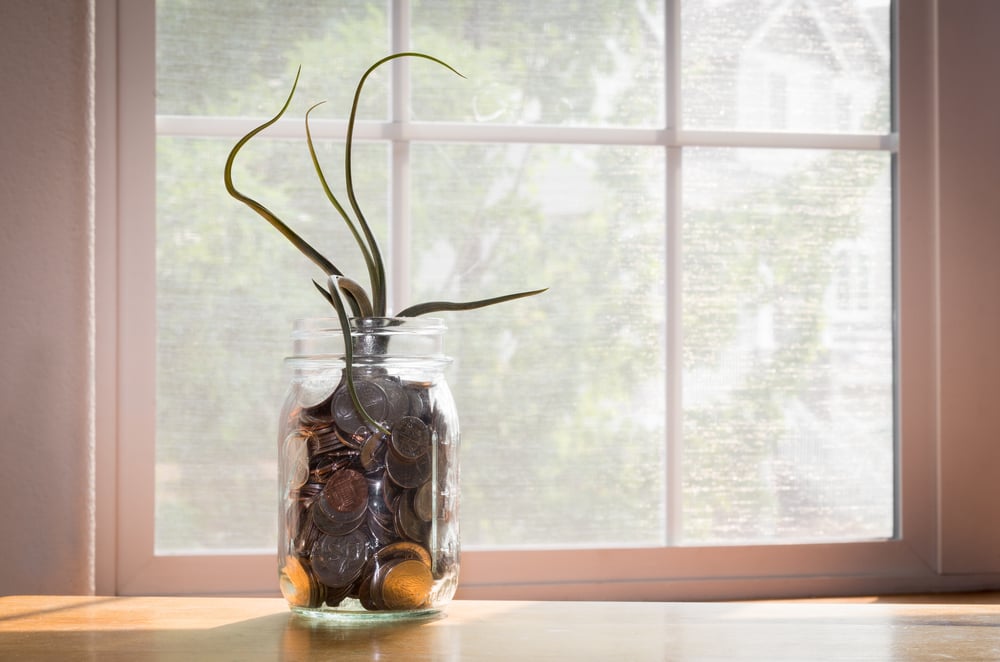
Identifying Characteristics and Facts
- Easy to maintain and can grow indoors.
- Have bulbs where the leaves grow. Have green or green-gray curly leaves.
- Grows up to 10 inches in height.
- Specialized trichomes for absorbing water and nutrients.
- Does well in indirect or bright light.
- Needs good air circulation for it to thrive.
- Grows without soil and doesn’t require a lot of care.
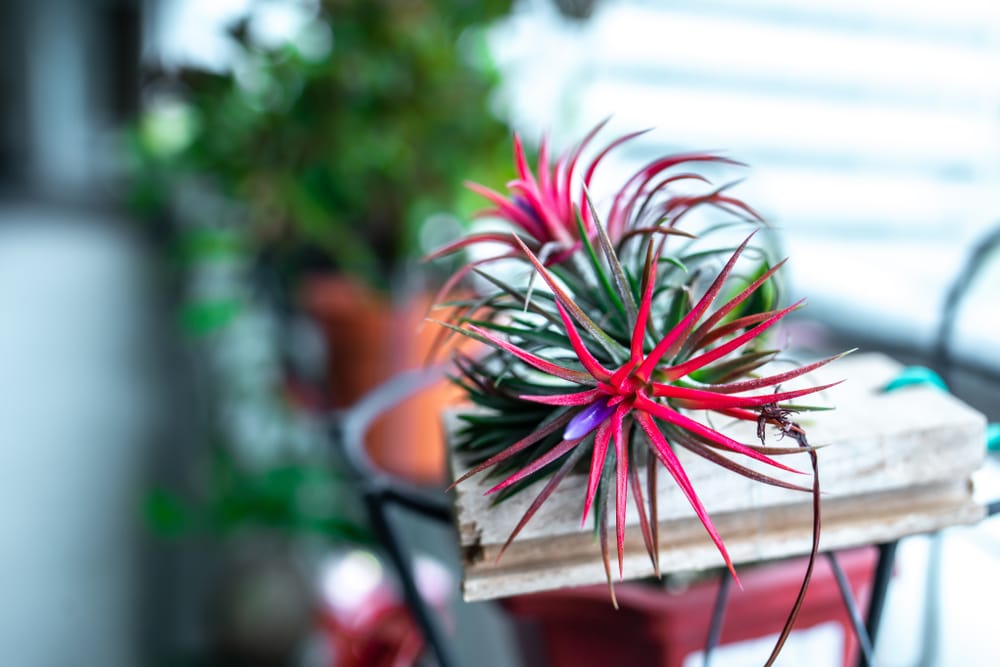
This bulbous air plant is a low-maintenance type that you can grow indoors for ornamental purposes. The appearance of this plant is just unique. It shows curly long leaves that mark its remarkable elegance.
The reason it is called a bulbous air plant is because of the bulb where its curly leaves emerge. You will see the green or gray-green color of the leaves that makes its appearance.
The advantage of this air plant is the fact that it doesn’t need much maintenance. That is why it is one of the best air plants for low light. It has specialized trichomes and doesn’t require soil for it to grow.
#6. Spider Plant (Chlorophytum comosum)
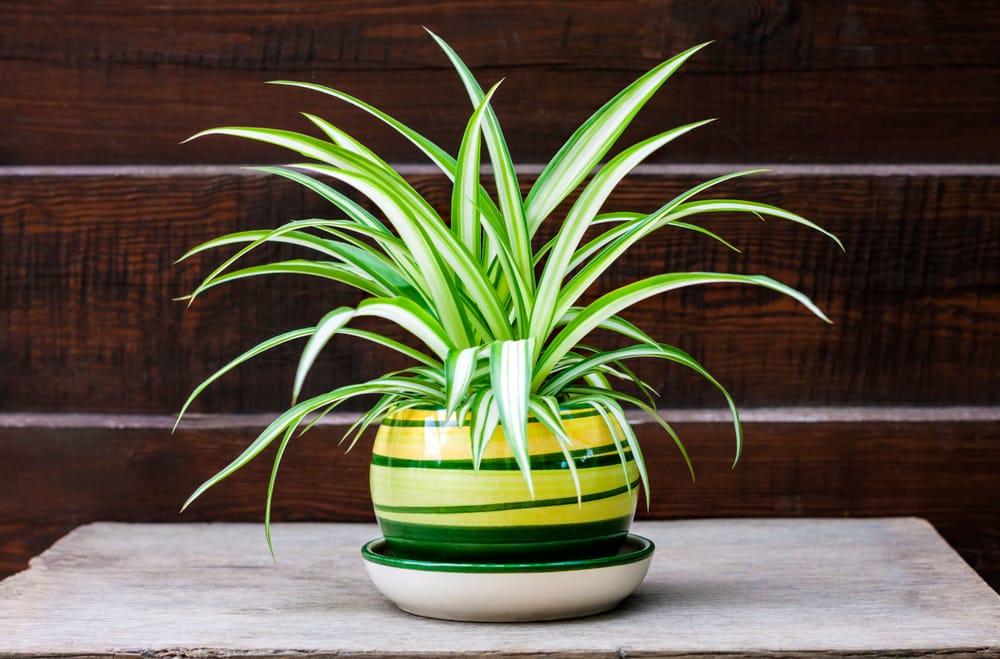
Identifying Characteristics and Facts
- Does not need a lot of caring.
- Have long and slender green leaves marked with stripes of white.
- Thrives in different conditions with good air circulation.
- Great for air purification and decoration purposes.
- Good for beginners without prior gardening experience.
- Well-suited for indoor environments.
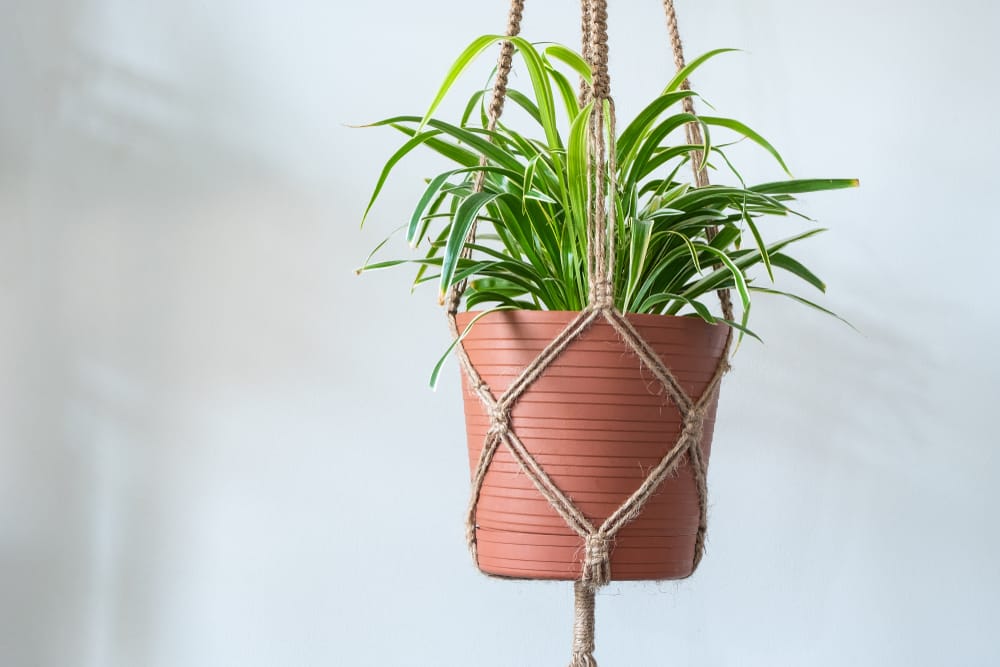
Spider air plant is among the most popular indoor air plants that don’t require a lot of maintenance. Its arching leaves define the appearance and elegance of this plant.
When it comes to origin, the spider plant is native to South Africa and is now common in many parts of the world. The air plant is adored due to the whimsical appearance it portrays. Marked by long and slender green leaves with white stripes, it cannot avoid your eyes whenever you come across it.
The advantage of this air plant is its resilience. It can thrive in a wide range of conditions and that makes it a good choice for low light.
They are loved for what they do. Spider plants are great when it comes to purifying the air apart from being excellent for decoration purposes.
#7. Harrisii Air Plant (Tillandsia harrisii)
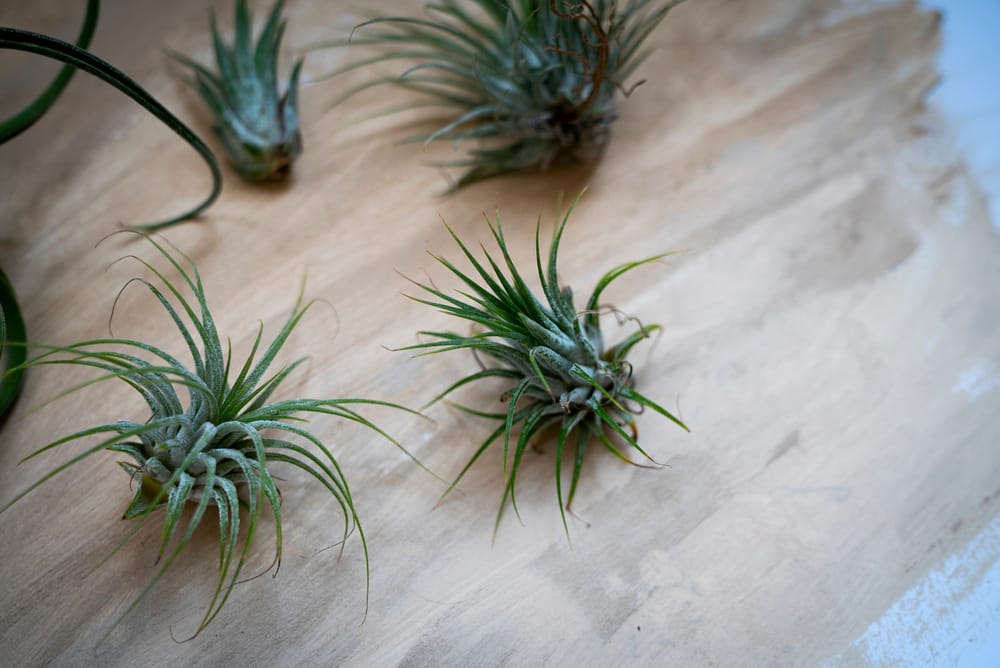
Identifying Characteristics and Facts
- Grows to about 4 – 6 inches in height.
- Easy to care for and don’t require fertilization.
- Does well in bright and indirect light.
- Requires moderate temperature and humidity to thrive.
- Good for indoor growing indoors.
- Have soft and silver-green densely arranged leaves.
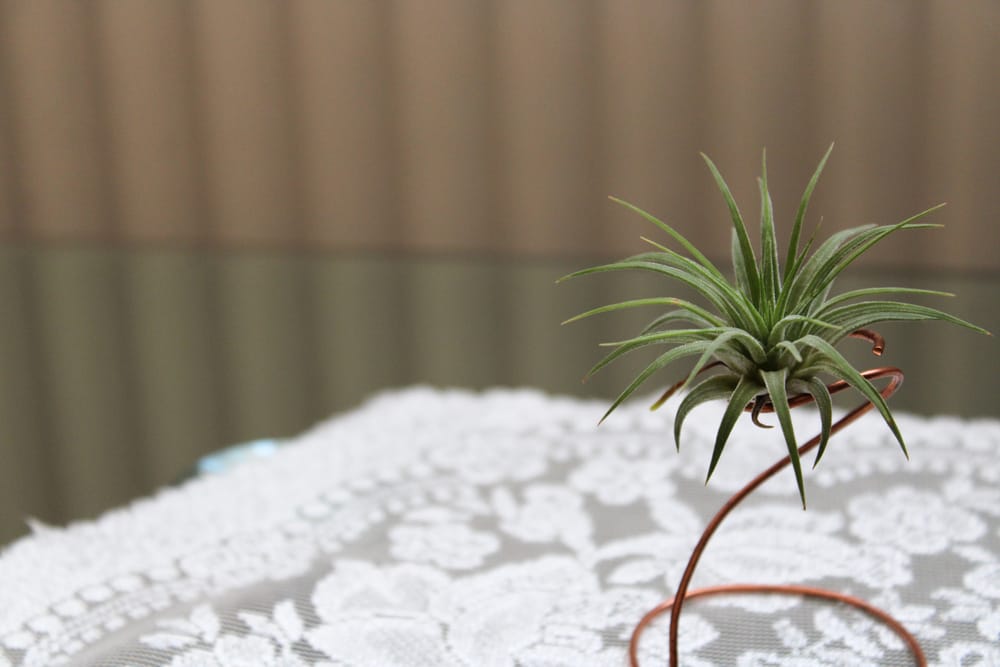
Harrisii air plant is a popular kind that is common in the Honduras rainforest and Guatemala. It is a unique type of air plant and a great choice as one of the best air plants for low light.
To care for this type, you don’t need to be a good gardener or have any prior experience. It is easy to manage and you only need to ensure it gets humidity and light whether direct or indirect.
You will love the elegant appearance of this great air plant. The silver-green leaves curl gracefully making it great for décor in homes and offices.
#8. Streptophylla Air Plant (Tillandsia streptophylla)
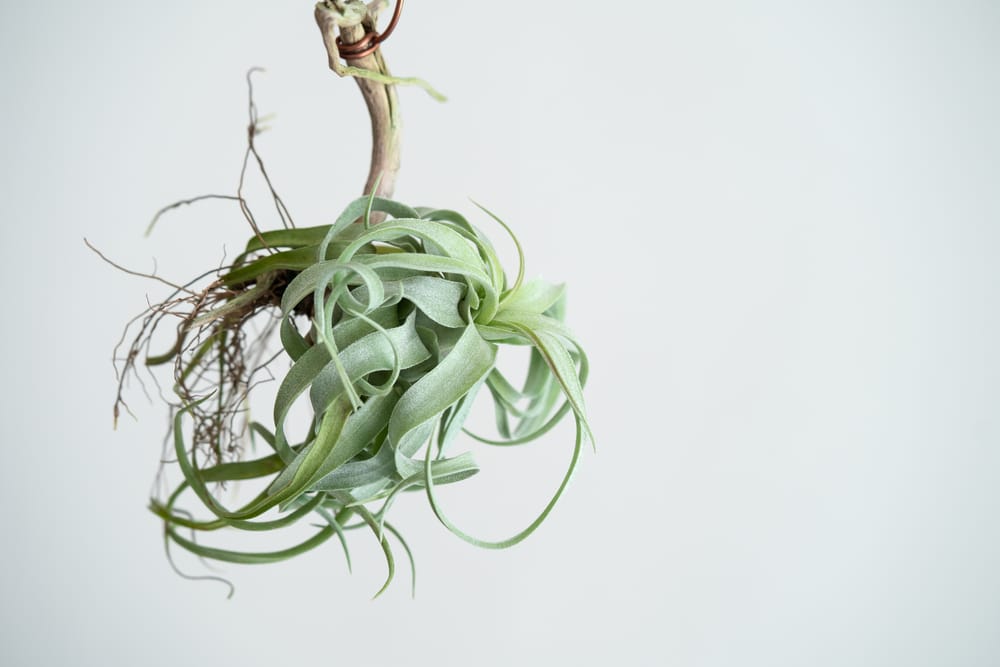
Identifying Characteristics and Facts
- Grows to about 10 – 14 inches in diameter.
- Produces a flower spike that can reach about 12 inches high.
- Have thick and curly silver-green leaves in a rosette shape.
- Easy to care for and thrives in an indoor environment.
- Need indirect and bright light with some good air circulation to thrive.
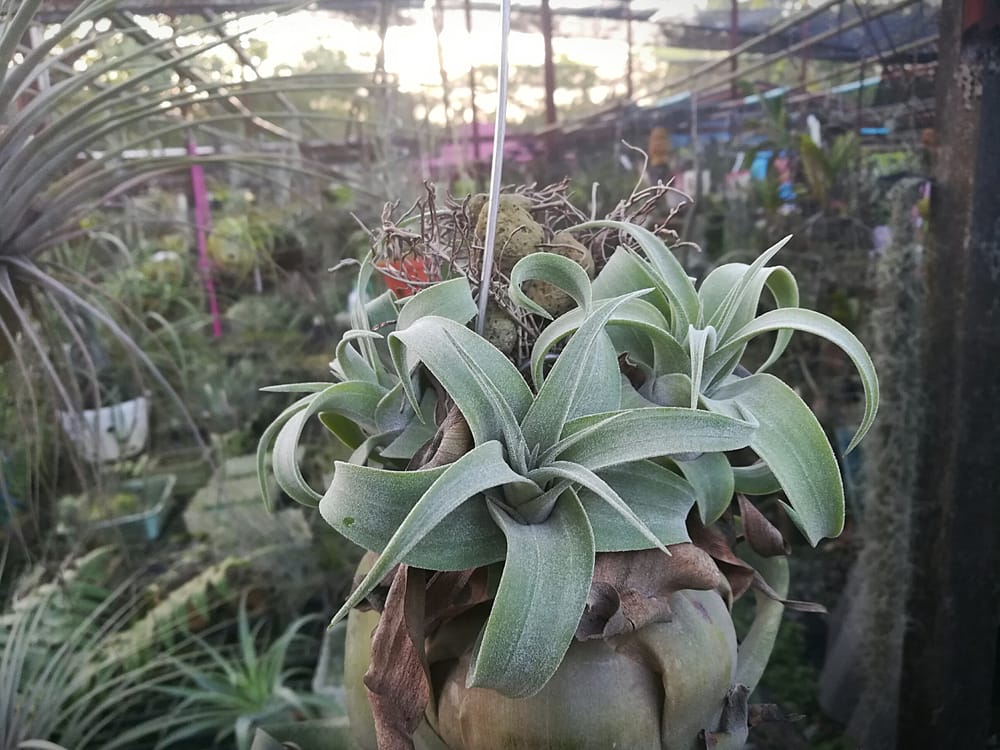
This is another unique species of air plant that is one of the best air plants for low light. It is a good option with a great and distinct leaf structure. It grows without soil and is easy to manage.
When it comes to appearance, you will find everything that you will like in this plant. It has curly, thick, silver-gray leaves, and a rosette shape. All these features make this air plant worth for décor among other functions.
In addition to all the features I have mentioned, it is also worthwhile to note that streptophylla air plant is highly adaptable and hence would easily adapt to any environment. That makes it a great option if you want it for indoor gardens or terrariums.
#9. Filifolia Air Plants (Tillandsia filifolia)
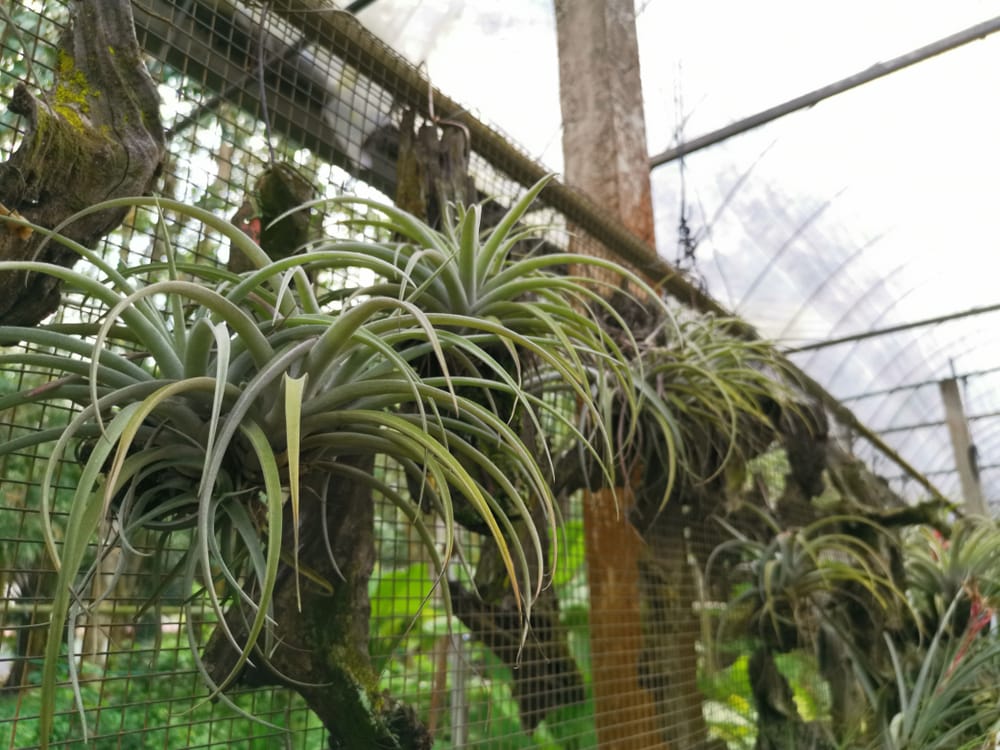
Identifying Characteristics and Facts
- Grows 12-18 inches in diameter and 12-18 inches leave length
- Leaves resemble threads and even look like a sea urchin
- Leaves have a green-to-yellow tint
- Perfect for Indoor Gardners who want a fun and decorative plant
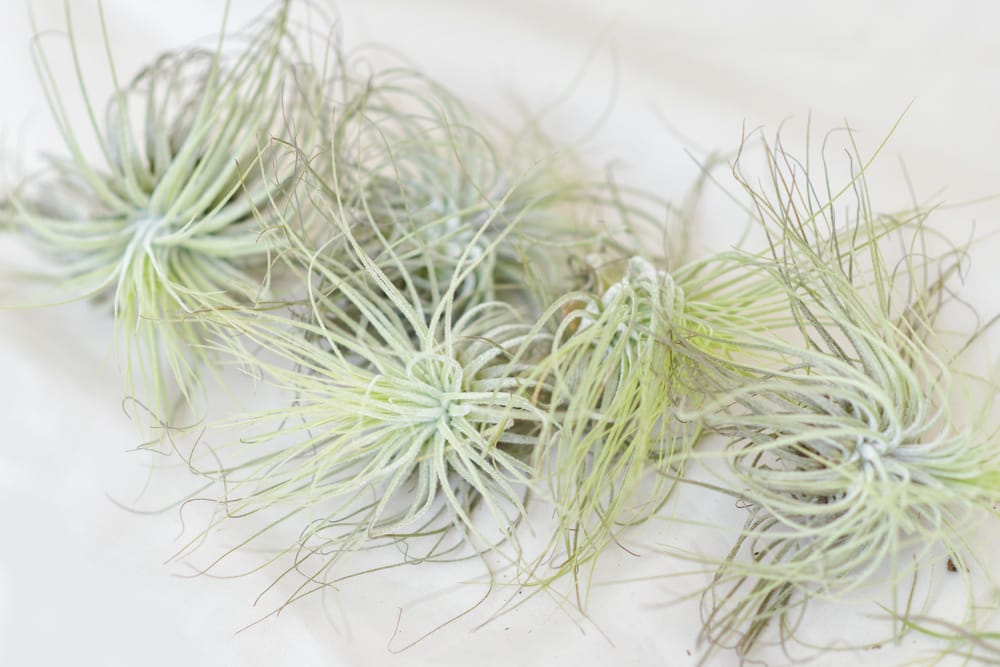
Tillandsia filifolia is another decorative air plant that is perfect for low light air plant growers. This specific air plant can have beautiful purple blooms and long whimsical leaves.
The Filifolia Air Plant typically grows in the high altitude of Central America and Mexico but is among one of the favorite Air Plants for gardeners to grow.
It should be noted that this air plant should be grown in partial shade and in jellyfish planters due to its long leaves.
#10. Usneoides Air Plant (Tillandsia usneoides)
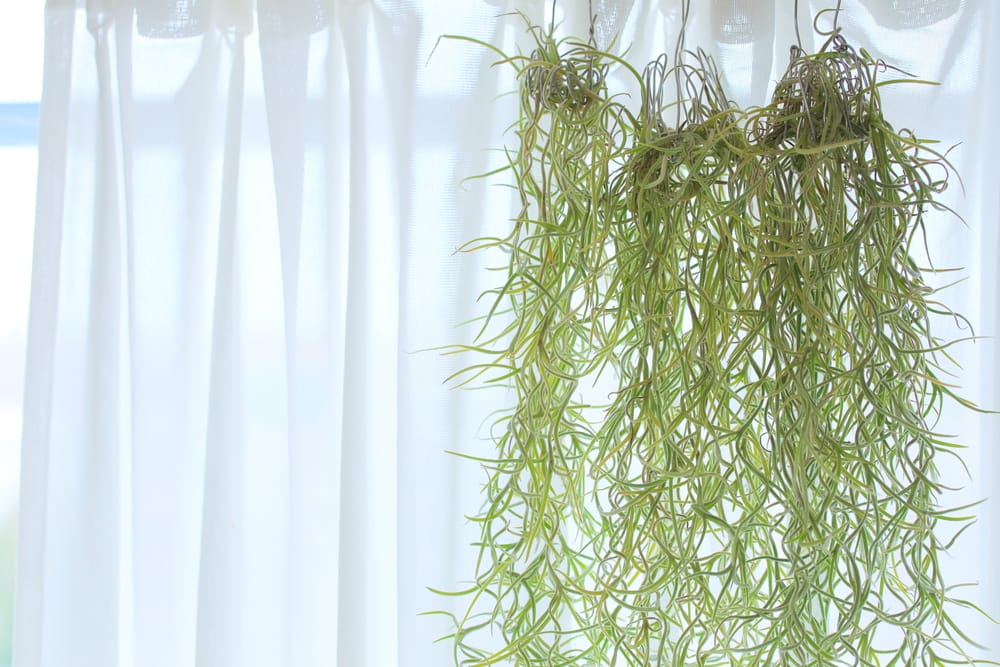
Identifying Characteristics and Facts
- Dangling Silver Leaves that can grow to 24 inches long
- Thrives in High Humidity
- Before air plant for both indoors and outdoors. Typically hung from ceilings or dining rooms
- Fits perfectly in Jellyfish planters
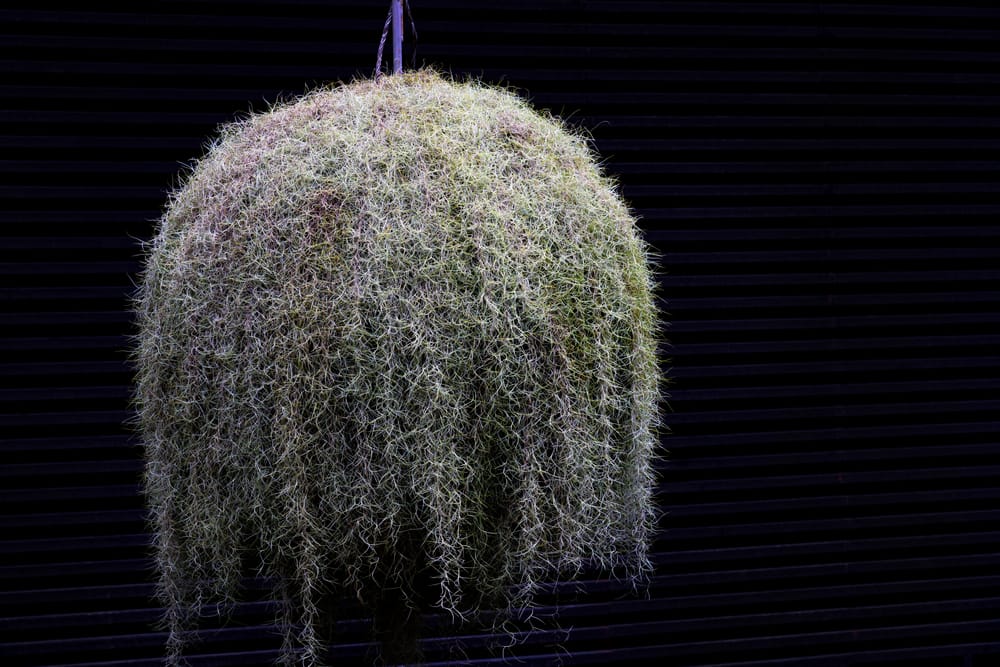
The Tillandsia usneoides is one of the most unique air plants that you can grow. It is often called Spanish Moss or Grandfather’s Whiskers due to its long leaves that drape over the plant.
This air plant is incredibly easy to grow and all you have to do is mist it once a week or dunk it in water for it to get its moisture.
This air plant typically grows in sub-tropical regions of America in high elevations, although you can grow it anywhere in your house since it gets its nutrients from the air.
Common Growing Factors of Low-Light Air Plants
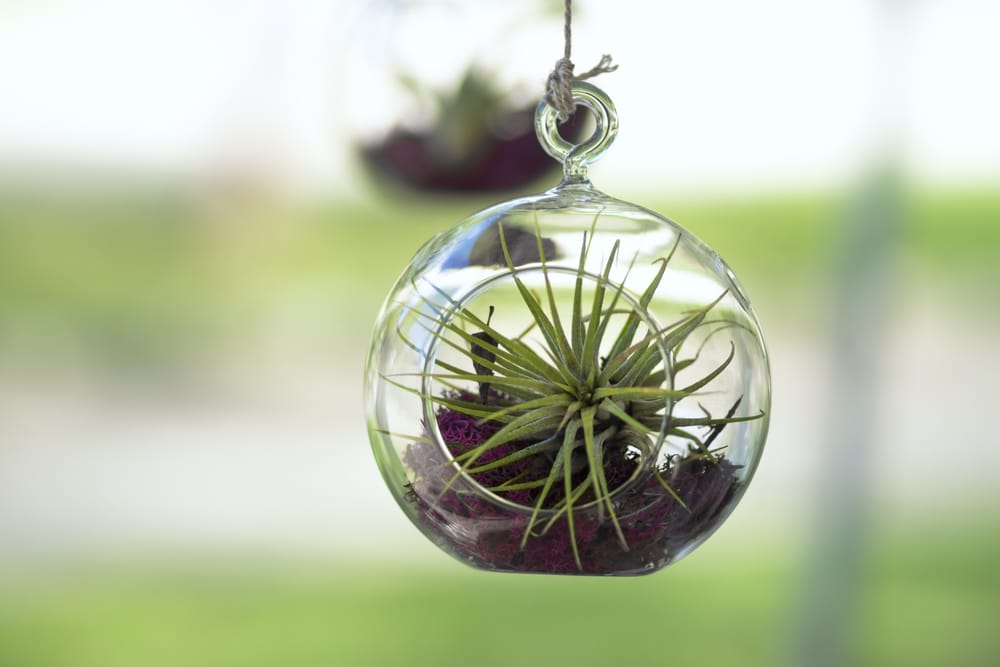
Air plants serve numerous purposes. These plants grow on other plants and hence you don’t need soil to grow them. Therefore, even if you forget or fail to water them, they will still grow since they get their nutrients from moisture and the air.
Another advantage of air plants is that they are not parasitic. Because of this, you can grow them anywhere in the world and anywhere in your house or yard.
Some of the other common growing factors of having air plants include the following:
- Air purification –air plants are well-known to be effective in enhancing the quality of air. They remove harmful pollutants such as benzene, toluene, and formaldehyde from the air.
- Decoration – you will find a variety of air plants with different features including colors, shapes, and sizes, and that makes them a good addition for décor.
- Medicinal purposes –air plants have traditionally been useful for medicinal purposes. They are effective in boosting the immune system, reducing stress, and improving sleep among other health benefits.